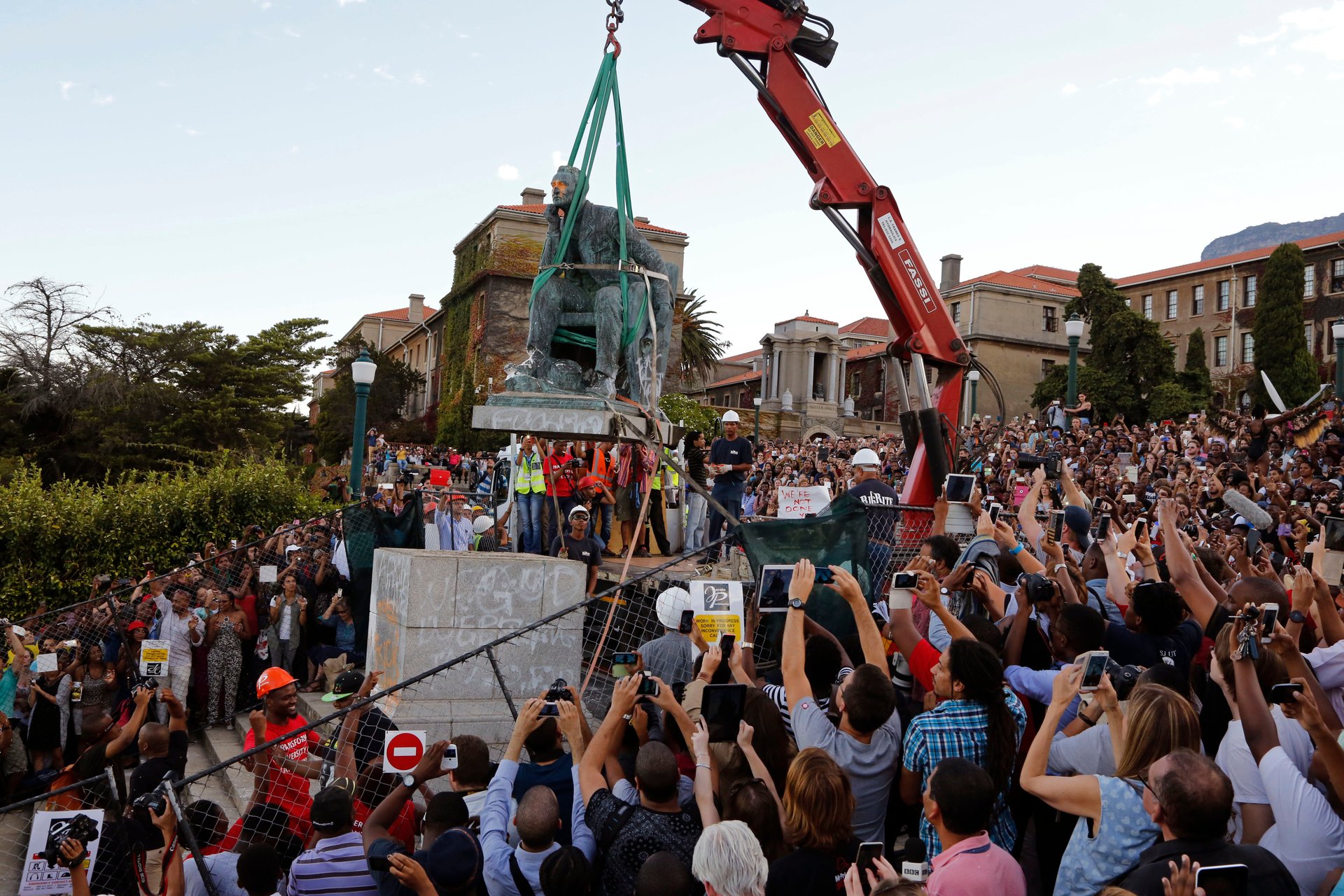Zimbabwe wants to make a trade with the UK for Cecil Rhodes’ remains
Zimbabwean president, Emerson Mnangagwa is pushing for the landmark return of colonial war trophies such as skulls of native leaders that were shipped to the UK and elsewhere in Europe in return for the remains of British colonialist Cecil Rhodes who is buried in the southern African country.


Zimbabwean president, Emerson Mnangagwa is pushing for the landmark return of colonial war trophies such as skulls of native leaders that were shipped to the UK and elsewhere in Europe in return for the remains of British colonialist Cecil Rhodes who is buried in the southern African country.
The call for the return of the Zimbabwean skulls comes after the country completed the historic creation of a statue of Mbuya Nehanda, a spirit medium and key liberation war figure in Zimbabwe’s early fight for independence. It is believed that her head is among many other remains of chiefs and other traditional leaders who fought against colonial oppression, that were taken to the UK.
Gibson Nyikadzino, an independent international relations analyst based in Harare, told Quartz, “Rhodes is a symbol of British cruel conquests in Africa whose dark side is being a figurehead of colonial subjugation and imperialism on the continent.”
While there have been calls in the recent past for a colonial reckoning on the continent and beyond of colonialists who are sometimes revered in the west, and reviled on the continent—the legacy of Cecil Rhodes is one of the major ones that is under scrutiny. Rhodes was a politician and businessman who was a firm believer and supporter of British imperialism.
It’s been a long time for colonial reckoning
Although Zimbabwe’s former president, Robert Mugabe largely shielded Cecil John Rhodes’ remains from being removed from the Zimbabwean grave by a group of liberation war fighters during the #RhodesMustFall campaign that started in South Africa in 2015, the current president, Emerson Mnangagwa, is now pushing for his remains to be repatriated back to his native UK. Mnangagwa is ratcheting up the pressure for the UK to return skulls and human bones of Zimbabwean liberation war luminaries.
“We still have Rhodes’ remains in Matobo. His [Rhodes] remains must be returned to where he hailed from and we can also have our ancestral remains which are being kept in Europe,” Mnangagwa told traditional leaders in Harare this week.
Matobo is now a Unesco World Heritage Site and a key tourism attraction, where foreigners are charged $15 entry and about $2 for locals. Rhodes’ grave, in addition to other colonial memorabilia such as the statue of David Livingstone—a British explorer and missionary—help bring in much needed tourism revenue although the covid-19 pandemic has hit tourism hard.
The restitution of Africa’s looted assets includes the return of human remains
An online campaign #BringBackOurBones launched in October this year has also been calling for the return of the Zimbabwean skulls and bones. In November, the campaign organizers protested at the British High Commission in Pretoria, South Africa, calling for the return of the first Chimurenga (liberation war) heroes and heroines’ skulls and artifacts.
A 2015 article by the BBC quotes the UK’s Natural History Museum saying it may have in its collection some human remains from Zimbabwe. The museum is said to hold as many as 20,000 human remains.
The return of artifacts and human remains from Europe to Africa has been in the limelight recently since the 2018 release of the French government-commissioned report by Senegalese economist Felwine Sarr and French historian Bénédicte Savoy. In November, France returned about 26 artifacts looted from Benin while in 2020, the Free University of Brussels (ULB) said it was returning human skulls taken to Belgium from the Congo during the colonial period.
The growing calls for the UK and other European countries such as Belgium and France to return African artifacts and remains of human remain trophies, this year forced the setting up of a cross-party British parliamentary group to discuss it and map a way forward.
“This is about starting a discussion and educating people. We’d hope to get to the stage of proposing legislation,” Bell Ribeiro-Addy, an MP and chair of the group, was quoted saying.
For the late Mugabe, a staunch critic of Britain, “keeping decapitated heads as war trophies, in this day and age, in a national history museum, must rank among the highest forms of racist moral decadence, sadism, and human insensitivity.”
As for Nyikadzino, the return of the remains and artifacts to Zimbabwe marks a major step forward. He says “Our heroes are in British museums and we need to have their remains repatriated, give them decent burials, their names immortalized and be part of our historical memorabilia. This is one of the major steps towards decoloniality as Zimbabwe embarks on building the Museum of African Liberation.”
Sign up to the Quartz Africa Weekly Brief here for news and analysis on African business, tech, and innovation in your inbox.